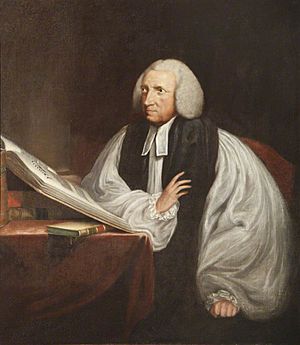Robert Lowth facts for kids
Quick facts for kids The Right Reverend and Right Honourable Robert Lowth FRS |
|
|---|---|
| Bishop of London | |

Portrait by Robert Edge Pine
|
|
| Church | Church of England |
| Diocese | Diocese of London |
| Elected | 1777 |
| Predecessor | Richard Terrick |
| Successor | Beilby Porteus |
| Other posts | Bishop of Oxford 1766–1777 Bishop of St David's 1766 Archdeacon of Winchester 1750–1766 Oxford Professor of Poetry 1741–1752 |
| Orders | |
| Ordination | 1735 |
| Consecration | 1766 |
| Personal details | |
| Born | 27 November 1710 Hampshire, Great Britain |
| Died | 3 November 1787 (aged 76) |
| Buried | All Saints Church, Fulham |
| Nationality | British |
| Denomination | Anglican |
| Parents | William Lowth |
| Profession | Academic (poetry & English grammar) |
| Alma mater | New College, Oxford |
Robert Lowth (born November 27, 1710 – died November 3, 1787) was an important figure in the Church of England. He was a bishop, a professor at Oxford University, and a famous writer. He wrote one of the most important textbooks on English grammar. He also made a big impact on how people understood the ancient Hebrew language.
Contents
Who Was Robert Lowth?
Robert Lowth was born in Hampshire, England. His father, Dr. William Lowth, was a clergyman and a writer about the Bible. Robert went to Winchester College and then to New College, Oxford in 1729. He earned his first degree in 1733 and a master's degree in 1737.
In 1735, while still at Oxford, Lowth became a priest in the Anglican Church. He worked as a vicar in a place called Ovington. In 1741, he became the Oxford Professor of Poetry. This was a special job where he taught about poetry at the university.
Lowth's Career and Achievements
Lowth became an important church leader. In 1750, he was made an Archdeacon in Winchester. He stopped being a poetry professor in 1752 and married Mary Jackson. Soon after, in 1753, he became a rector in East Woodhay.
In 1754, Oxford University gave him a special degree called a Doctorate in Divinity. This was for his book about Hebrew poetry. The book was first written in Latin, but it was later translated into English. It was called "Lectures on the Sacred Poetry of the Hebrews".
Lowth was also chosen to be a member of the Royal Society in London in 1765. This is a group for important scientists and thinkers.
Becoming a Bishop
In 1766, Lowth became a bishop of St David's in Wales. Later that same year, he moved to become the bishop of Oxford. He stayed as Bishop of Oxford until 1777. Then, he became the Bishop of London, which was a very important position. He was also offered the chance to become the Archbishop of Canterbury in 1783, but he said no because he was not well.
Robert Lowth passed away in 1787. He was buried at All Saints Church, Fulham.
Understanding Ancient Hebrew Poetry
Robert Lowth was one of the first modern scholars to really study the poetry in the Old Testament of the Bible. He noticed how the Psalms and other parts of the Bible used a special kind of structure called parallelism.
What is Parallelism?
In his lectures, Lowth explained that Hebrew poetry often uses ideas that are repeated or balanced. He found three main types:
- Synonymous parallelism: This is when two lines say the same thing in different words. For example, "The Lord is my shepherd; I shall not want."
- Antithetic parallelism: This is when two lines say opposite things. For example, "A wise son makes a glad father, but a foolish son is a sorrow to his mother."
- Synthetic parallelism: This is when the second line adds more information or completes the thought of the first line.
Lowth's ideas about parallelism are still very important today for people who study the Bible.
Improving English Grammar
Lowth is also famous for his book published in 1762, called A Short Introduction to English Grammar. He wrote this book because there were no simple grammar textbooks for students at the time.
Rules for English
Lowth's grammar book became very popular. It introduced many of the grammar rules that are still taught in schools today. He was one of the first people to not just describe how English was used, but also to say how it should be used.
For example, he suggested that it's better not to end a sentence with a preposition (like "for" or "with"). So instead of saying "What did you ask for?", he thought it was more proper to say "For what did you ask?". Even though people often use sentences ending with prepositions in everyday talk, Lowth thought it was less formal.
Lowth also pointed out "wrong grammar" by giving examples from famous writers like Shakespeare and the King James Bible. He believed that English grammar should follow rules, even though he knew it was different from Latin. His book was not written for children, but soon, simpler versions were made for schools. This book was used in schools for a very long time, even into the 20th century.
Images for kids
 | Sharif Bey |
 | Hale Woodruff |
 | Richmond Barthé |
 | Purvis Young |


